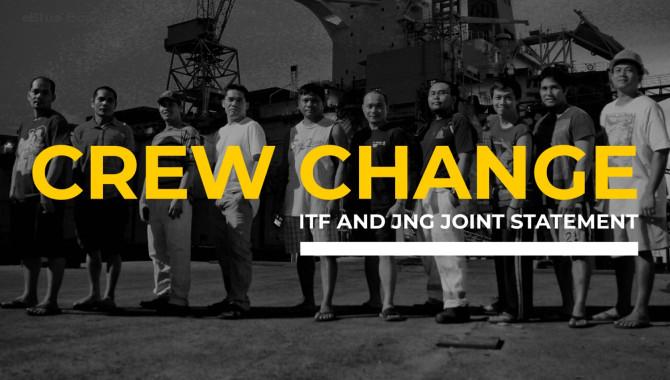Recommended Framework of Protocols for ensuring safe ship Crew Changes and travel during the Coronavirus (Covid-19) Pandemic
The Joint Negotiating Group (JNG) representing employers and the International Transport Workers Federation (ITF) representing seafarers unions and their members welcome the International Maritime Organisation (IMO) Circular Letter (No.4204/Add.14) that was issued last week on the 5 May 2020 to all IMO Member States, United Nations and specialised agencies, Inter-governmental and Non-governmental organizations in consultative status with IMO.
The circular letter provides a framework of protocols to ensure crew changes can be done safely and as soon as possible, whilst appreciating the significant challenges facing the global maritime industry brought about by Covid-19. The letter also highlights the critical yet often unknown and overlooked plight of the seafarers and the important role they play in the world economy and to our society; to wit;
“Shipping is vital to the maintenance of global supply chains, but the current situation is unsustainable for the safety and wellbeing of ship crew and the safe operation of maritime trade. Each month about 150,000 seafarers need to be changed over to and from the ships which they operate to ensure compliance with international maritime regulations for ensuring safety, crew health and welfare, and the prevention of fatigue.”
Previously, as responsible social partners, the JNG (comprising of International Maritime Employers Council, International Mariners Management Association of Japan, Korean Shipowners Association and Evergreen) and the ITF(representing 215 seafarers unions and their 1 million members) agreed twice to extend the seafarers’ contracts in order to keep them safe from exposure to Covid-19 and also appreciating the enormity of the challenges this global pandemic poses in terms of travel restrictions and flights availability.
Consequently, a significant number of seafarers have been required to stay on board beyond their employment contract period while others are waiting to be deployed so that they can join their ships and continue to earn a living.
In discussions last week, JNG and ITF agreed that the current situation in regards to lack of crew change can no longer continue since this could be detrimental to the health and wellbeing of the seafarers, putting them at risk as well as the environment and the global supply chain.
Seafarers’ fatigue should not be underestimated and the social partners therefore agreed to not extend the contracts, but to support an implementation period of no longer than 30 days (up until 15 June 2020) so that governments have time to implement the framework of protocols as set out in the IMO Circular Letter.
Therefore, the parties have agreed:
- To support a transition period for governments and employers to implement the IMO issuedframework of protocols, allowing up to 30 days starting from 15 May 2020 to ensure safe facilitation of crew changes takes place;
- That companies will consider, if financially viable and possible, to financially acknowledge every seafarer whose employment contract has expired, but who has continued to work;
- That companies will consider, if financially viable and possible, to provide seafarers waiting to be deployed an advance salary payment;
- That companies will, where possible, provide seafarers with extra bandwidth and internet access to be able to communicate with home; and
- That, when crew change commences, those seafarers who have been on-board the longestwill be prioritised and repatriated first regardless of rank.
Finally the ITF and the JNG want to alert Flag States, P&I Clubs, Operators and Charterers that, in the event of the Framework of Protocols for Crew Change not taking effect by mid-June 2020, the consequence of stress related sickness affecting seafarers and their inability to consistently access medical support ashore may negatively impact on the commercial
viability of the ship operation














